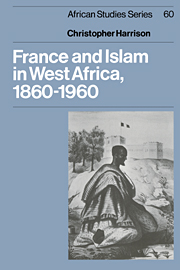Book contents
- Frontmatter
- Contents
- Acknowledgements
- Abbreviations
- Map
- 1 Introduction
- PART I 1850–1898: NINETEENTH-CENTURY ORIGINS OF FRENCH ISLAMIC POLICY
- PART II 1898–1912: THE FEAR OF ISLAM
- PART III FRENCH SCHOLARSHIP AND THE DEFINITION OF ISLAM NOIR
- PART IV 1920–1940: THE FRENCH STAKE IN ISLAM NOIR
- Notes
- Bibliography
- Index
PART III - FRENCH SCHOLARSHIP AND THE DEFINITION OF ISLAM NOIR
Published online by Cambridge University Press: 01 February 2010
- Frontmatter
- Contents
- Acknowledgements
- Abbreviations
- Map
- 1 Introduction
- PART I 1850–1898: NINETEENTH-CENTURY ORIGINS OF FRENCH ISLAMIC POLICY
- PART II 1898–1912: THE FEAR OF ISLAM
- PART III FRENCH SCHOLARSHIP AND THE DEFINITION OF ISLAM NOIR
- PART IV 1920–1940: THE FRENCH STAKE IN ISLAM NOIR
- Notes
- Bibliography
- Index
Summary
Va dire au Gouverneur que nous lui obéissons. Que nous executerons ses ordres et que nous respecterons ses dépenses.
Et que nous n'opposerons pas aux oeuvres enterprises par lui, à ce qu'il nous commandera d'important ou de minime, ses moindres ordres seront obéis.
Je me confie à Dieu contre tous les maux du Siècle.
(Verses from the poem of Sheikh Sankoum of Tonba (Guinea), ‘Sur la Puissance des Chrétiens’, 1912. This is the translation from the original Arabic made by the French administrator Gilbert Vieillard who made a lifelong study of Fulbe custom and culture. This and other manuscripts which he collected can be found in the archives of IFAN, Fonds Vieillard.)
You are an intelligent fellow, and you will ask how a Polish adventurer, meaning Enver, and a collection of Jews and Gipsies should have got control of a proud race. The ordinary man will tell you that it was German organization backed up with German money and German arms. You will enquire again how, since Turkey is primarily a religious power, Islam has played so small a part in it all. The Sheikh-ul-Islam is neglected, and though the Kaiser proclaims a Holy War and calls himself Hadji Mohammed Guilliamo, and says the Hohenzollerns are descended from the Prophet, that seems to have fallen pretty flat. The ordinary man again will answer that Islam in Turkey is becoming a back number, and that Krupp guns are the new gods. Yet – I don't know. I do not quite believe in Islam becoming a back number.
(John Buchan, Greenmantle, 1916.)- Type
- Chapter
- Information
- France and Islam in West Africa, 1860–1960 , pp. 91 - 92Publisher: Cambridge University PressPrint publication year: 1988



